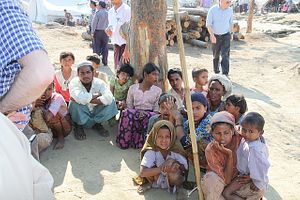Myanmar is changing and changing in the right direction.
These were the exact words used by Myanmar’s Foreign Minister Wunna Maung Lwin when he spoke at the United Nations General Assembly of world leaders in New York on September 29, 2014.
He declared that “positive changes” and “winds of change” have spread across Myanmar in the past three years, which have become the solid foundations of a democratic state.
The foreign minister mentioned three waves of reforms initiated by the government: The first was the “peaceful transformation from the military government to a multiparty democratic system.” The second involved economic, administrative and private-sector development reforms. And the third is supposed to deliver benefits to the people by fulfilling their socio-economic needs.
It was the first wave of reforms that impressed the international community when Myanmar granted amnesties, released political prisoners, conducted elections, abolished press censorship, and allowed private newspapers to publish again.
But many of these reforms were questioned in recent months when state forces were accused of violating the rights of citizens, especially those who were protesting against government policies. The new UN Special Rapporteur on Myanmar, Yanghee Lee, reported last July that there is a shrinking of democratic space for civil society and the media. The censorship board has been abolished but media persecution continues as critical journalists are either charged in the courts or detained for doing their job. There is media space but as the independent newspaper The Irrawaddy clarifies, “the limits of that space are still decided by the state.”
Another issue that Myanmar confronted in the past year is the ethnic and religious violence that has displaced Rohingya Muslims. The intermittent clashes between radical Buddhist groups and some Muslims also reflected the deep divide and continuing tension between several ethnic communities.
Perhaps in response to the accusation that the government is conspiring with Buddhists in attacking Muslim villages, the foreign minister urged critics to acknowledge the efforts of the government to bring peace and harmony in the country. “The history, the diversity and the complexity of the issue must be fully understood before jumping to conclusion. The situation should not be looked at in a superficial manner. The international community should contribute pragmatically and objectively to find a durable solution.”
He then enumerated several measures implemented by the government to promote human rights, such as the enactment of a new media law, granting of presidential amnesties, endorsement of a zero tolerance policy on the use of rape and sexual violence as a weapon of war, prevention of recruitment of underage children in the army, and the revamping of the Myanmar National Human Rights Commission to make it more independent.
Related to this, the foreign minister asserted that it is time to remove Myanmar in the agenda of the UN Human Rights Council. “All major concerns related to human rights have been addressed to a larger extent in the new Myanmar. We have now reached the middle tier of the human rights ladder.”
Reacting to this statement, various activist groups highlighted the continuing “systematic rights abuses” perpetrated by the army and police against the civilian population. They also pointed out that the local human rights body was replaced with individuals affiliated with high officials. They were allegedly not consulted about this reshuffle.
Perhaps anticipating the voices of opposition, the foreign minister appealed for understanding, since Myanmar “democracy is still in its infancy” and that “the government has a long to-do list with limited capacity.” He assured global leaders that the Myanmar government is not complacent and that it’s aware of the challenges in reforming and building a democratic state. He also asked for fairness. “The development in Myanmar should also be viewed in a more balanced and objective manner.”
Indeed, the international community should encourage the wave of reforms to continue in the “new Myanmar.” It should recognize the decision of the Union Parliament to approve Myanmar’s accession to the Biological Weapons Convention (1972), and take note that Myanmar is currently the chair of the Association of Southeast Asian Nations; a daunting task since this is a crucial period for the regional grouping as it moves towards full integration next year. The world can also hope that the 14 peace agreements signed by the government will lead to a genuine national reconciliation and end the world’s longest ongoing civil war. And we can all get on board with Myanmar’s plan to graduate from Least Developed Countries status.
But the contrary voices that dispute the glowing report on Myanmar at the UN meeting should not be dismissed. They are valid since they seek to present what ordinary Burmese are experiencing on the ground. Myanmar should sit down with these groups, listen to their perspectives, and work with them in pursuing the reforms which are essential to make democracy a genuine phenomenon in the country.

































